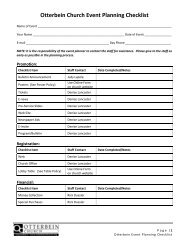Discipline With Young Children - Waynesboro Otterbein Church
Discipline With Young Children - Waynesboro Otterbein Church
Discipline With Young Children - Waynesboro Otterbein Church
You also want an ePaper? Increase the reach of your titles
YUMPU automatically turns print PDFs into web optimized ePapers that Google loves.
<strong>Discipline</strong><br />
with young children
disciplining<br />
<strong>Young</strong> <strong>Children</strong><br />
From Craig Schuler, Pastor of Next Generation and Faith at Home Ministries<br />
with Kurt Bruner, The Center for Strong Families<br />
The scriptures command parents to raise children in the training and instruction<br />
of the Lord. We begin “training” a child from a very young age by the ways<br />
we respond to their actions and attitudes. The primary purpose of discipline is<br />
to consistently direct your child toward right relationship with God and others.<br />
Several practices contribute to that process.<br />
Establish Your Authority<br />
<strong>Children</strong> need a clear answer to the question “Who’s the boss?” Mom and Dad<br />
embody the protection and provision that come from submitting ourselves to<br />
a loving heavenly Father. God has delegated oversight of your child’s welfare<br />
and development to you, placing you in a position of authority over them.<br />
Starting when children are very young, parents need to model clarity and<br />
consistency. Unclear rules and sporadic reinforcement breed insecurity. You<br />
must say what you mean, mean what you say and act upon it. Don’t overlook<br />
defiant behavior just because the specific issue seems minor, or because it’s<br />
difficult to stop and discipline at the moment. <strong>Children</strong> are commanded to<br />
obey their parents and parents to train their children even when it is inconvenient<br />
to do so (see Colossians 3:20-21).<br />
<strong>Discipline</strong> Rather Than Punish<br />
Punishment is negative –making someone pay for what they’ve done. But discipline<br />
is positive – training toward a better future. Like touching a hot stove,<br />
we learn from the consequences of our actions. <strong>Discipline</strong> in childhood helps<br />
children avoid “learning the hard way” later in life.<br />
Many parents ask about the use of spanking to help shape a child’s will. The<br />
scriptures teach that “Foolishness is bound up in the heart of a child; the rod<br />
of correction will drive it far from him.” (see Proverbs 22:15, 13:24 and 29:15).<br />
Administering “the rod” apart from biblical principles, however, can cause<br />
more harm than good. Corporal discipline should only be used within guidelines<br />
such as those offered by Christian parenting experts. Several books can<br />
help you learn to apply spanking, time-out and other methods of discipline in<br />
healthy and productive ways. (see “Going Further Resources”)
Regardless of which form of discipline you use, however, the key is consistency.<br />
As author Ginger Plowman explains, it is not the severity of punishment<br />
but the “certainty of consequence” that makes the difference.<br />
God holds parents accountable for how they use the authority He has given<br />
them. The scriptures instruct parents not to “exasperate” or “embitter” their<br />
children (see Colossians 3:21). Don’t treat childish immaturity the same as willful<br />
defiance. Parents should never discipline children out of embarrassment,<br />
frustration or anger. Accidentally spilling the milk or waking the baby is not<br />
an occasion for stern discipline. But ignoring direct disobedience can make a<br />
child vulnerable to an ongoing spirit of rebellion.<br />
Parents are called to protect their children from the ruin of an undisciplined<br />
life and point them to their need for a savior (see Proverbs 23:14 and Romans<br />
3:22-24). Ultimately, the discipline you apply should be used in a way that<br />
restores right relationship. It should provide a consequence that leads the<br />
child to repentance (sorrow for their wrong behavior) and restoration of the<br />
relationship with mom, dad and others.<br />
Lovingly Instruct<br />
Starting in the preschool years, discipline and instruction should become a<br />
package deal (see Ephesians 6:4). Don’t make the mistake of allowing your<br />
desire for changed behavior to replace your desire for a changed heart.<br />
Use simple probing questions and share specific scriptures about wrong<br />
choices to instruct your child toward repentance. After disciplining a 2-yearold<br />
temper tantrum, for example, you might explain that “God wants us to<br />
obey.” <strong>With</strong> a 4-year-old you can go further, explaining self-control, reading<br />
Titus 2:6 and asking the child “Do you think that you were self-controlled or<br />
out-of-control?” Such loving instruction after discipline helps train your son or<br />
daughter to think like a follower of Christ rather than merely behave in order<br />
to avoid punishment.
GOING FURTHER – Resources<br />
Shepherding a Child’s Heart by Tedd Tripp explains the process of shaping a<br />
child’s heart rather than simply correcting their behavior.<br />
Making <strong>Children</strong> Mind without Losing Yours by Dr. Kevin Leman equips<br />
parents with seven principles of “Reality <strong>Discipline</strong>”—a loving, no-nonsense<br />
approach that really works.<br />
801 Park St. • 912 S. Potomac St.<br />
<strong>Waynesboro</strong>, PA 17268 • 717.762.7147<br />
service times: Sundays 8, 9:20 & 10:45 a.m.




